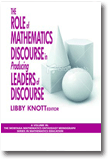
The Role of Mathematics Discourse in Producing Leaders of Discourse
By:
Libby Knott, Washington State University
A volume in the series: The Montana Mathematics Enthusiast. Editor(s): Bharath Sriraman, University of Montana.
Published 2010
The intent of this monograph is to showcase successful implementation of mathematical discourse in the classroom. Some questions that might be addressed are:
* How does a teacher begin to learn about using discourse purposefully to improve mathematics teaching and learning?
* How is discourse interwoven into professional development content courses to provide teachers with the tools necessary to begin using discourse in their own classrooms?
* What does a discourse-rich classroom look like and how is it different from other classrooms, from both the teacher's and the students' perspectives?
* How can teachers of pre-service teachers integrate discourse into their content and methods courses?
* How can we use discourse research to inform work with teachers, both pre- and in-service, for example, to help them know how to respond to elicited knowledge from students in their classrooms?
* What are the discourse challenges in on-line mathematics courses offered for professional development? Can on-line classrooms also be discourse-rich? What would that look like?
* In what ways does mathematical discourse differ from discourse in general?
CONTENTS
Preface to The Role of Mathematics Discourse in Producing Leaders of Discourse, Bharath Sriraman. Student Mathematical Discourse and Team Teaching, Martha VanCleave and Julie Fredericks. Creating a Discourse-Rich Classroom (DRC) on the Concept of Limits in Calculus: Initiating Shifts in Discourse to Promote Reflective Abstraction, Robert W. Cappetta and Alan Zollman. Discursive Practices in College Pre-Calculus Classes, Jo Clay Olson, Libby Knott, and Gina Currie. "Yeah, but what if...?": A Study of Mathematical Discourse in a Third-Grade Classroom, Karen M. Higgins, Cary Cermak-Rudolf, and Barbara Blanke. The Role of Tasks in Promoting Discourse Supporting Mathematical Learning, Sean Larsen and Joanna Bartlo. Learning to Use Students’ Mathematical Thinking to Orchestrate a Class Discussion, Blake E. Peterson and Keith R. Leatham. Orchestrating Whole-Group Discourse to Mediate Mathematical Meaning, Mary P. Truxaw and Thomas C. DeFranco. Eliciting High-Level Student Mathematical Discourse: Relationships between the Intended and Enacted Curriculum, Nicole Miller Rigelman. Beyond Tacit Language Choice to Purposeful Discourse Practices, Beth Herbel-Eisenmann. Care to Compare: Eliciting Mathematics Discourse in a Professional Development Geometry Course for K–12 Teachers, Maria G. Fung, David Damcke, Dianne Hart, Lyn Riverstone, and Tevian Dray. Sociomathematical Norms in Professional Development: Examining Leaders’ Use of Justification and its Implications for Practice, Rebekah Elliott, Kristin Lesseig, and Elham Kazemi.
-
Paperback978-1-60752-282-9
Web price: $45.04 (Reg. 52.99)
-
Hardcover978-1-60752-283-6
Web price: $80.74 (Reg. 94.99)
- eBook9781607522843

- EDU037000 - EDUCATION: Research
- EDU015000 - EDUCATION: Higher
- MAT030000 - MATHEMATICS: Study & Teaching
-
 Critique as Uncertainty
Critique as Uncertainty
-
 Crossroads in the History of Mathematics and Mathematics Education
Crossroads in the History of Mathematics and Mathematics Education
-
 Interdisciplinarity for the 21st Century
Proceedings of the 3rd International Symposium on Mathematics and its connections to the Arts and Sciences, Moncton 2009
Interdisciplinarity for the 21st Century
Proceedings of the 3rd International Symposium on Mathematics and its connections to the Arts and Sciences, Moncton 2009
-
 Selected writings from the Journal of the British Columbia Association of Mathematics Teachers
Celebrating 50 years of Vector
Selected writings from the Journal of the British Columbia Association of Mathematics Teachers
Celebrating 50 years of Vector
-
 Selected writings from the Journal of the Mathematics Council of the Alberta Teachers' Association
Celebrating 50 years (1962-2012) of delta-K
Selected writings from the Journal of the Mathematics Council of the Alberta Teachers' Association
Celebrating 50 years (1962-2012) of delta-K
-
 Selected Writings from the Journal of the Saskatchewan Mathematics Teachers' Society
Celebrating 50 years (1961-2011) of Vinculum
Selected Writings from the Journal of the Saskatchewan Mathematics Teachers' Society
Celebrating 50 years (1961-2011) of Vinculum
-
 The Development of Teaching Expertise from an International Perspective
The Development of Teaching Expertise from an International Perspective

